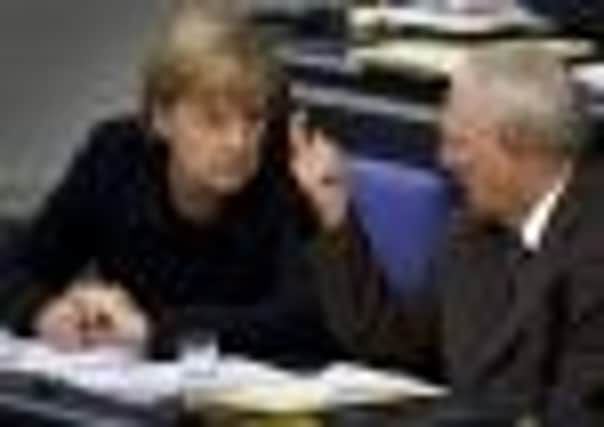Rally halted as Germany deals blow on eurozone plan hopes


Markets have rallied for days on hopes for the plan, which is widely expected to focus on lightening Greece’s debt load, making banks raise more money and boosting the scope of the eurozone bailout fund’s lending capacities.
Schaeuble said leaders expected to adopt a five-point plan to address instability within the eurozone but that more work would still need to be done.
Advertisement
Hide AdAdvertisement
Hide Ad“We will not … have the definitive solution on the weekend,” the finance minister said in Düsseldorf, “But we want to get rid of the market uncertainty with the five elements.”
Stocks and the euro fell after the comments as investors reined in their expectations that the meeting next Sunday in Brussels would mark a turning point for the beleaguered 17- nation currency zone.
After strong early gains, the FTSE 100 closed down 29.66 at 5436.70, the Paris Cac-40 index fell 51 to 3166.9 and the Dax in Frankfurt was down 107,77 at 5859.43. US stocks, meanwhile, suffered their worst losses in two weeks. The euro fell 1 per cent against the dollar as investors continued to shun risk.
Optimism had grown earlier this month when German chancellor Angela Merkel and French president Nicolas Sarkozy said the EU meeting would yield a “comprehensive response” of measures to counter the debt crisis.
One of the key sticking points is getting banks to take sharper losses on the Greek government debt they hold without causing a messy default that could roil markets and plunge the global economy back into recession.
A second bailout for Greece tentatively agreed in July calls for a 21 per cent write-down on the debt, but European officials say Greece needs an even bigger discount, possibly 50 per cent. Talks with representatives of the banks are still ongoing.
To protect the banks from such losses, the EU plan is expected to call for them to have stronger capital buffers.
Schaeuble endorsed the European Commission’s proposal to force key lenders to raise the financial pad they maintain to absorb losses to about 9 per cent of their loans, investments and other risky assets. “I assume that in Europe we will agree on the 9 per cent,” he said yesterday.
Advertisement
Hide AdAdvertisement
Hide AdAnalysts have estimated that such new core capital rules might require the biggest banks to raise several billion euros each. If they fail to raise it from investors, they would have to turn to their government.
Forcing banks within months to raise their capital buffer to 9 per cent would effectively mean advancing new international rules on bank capital, the Basel III rules, which were meant to be binding only in 2019. To pass this summer’s stress tests, European banks only needed to have capital cushions of 5-6 per cent. The EU’s plan would seek ways to maximise the impact of the €440 billion (£348bn) bailout fund, or European Financial Stability Facility. Some have suggested that the fund guarantee a part of government bonds issued, to boost their appeal to investors.
Details on all these plans are scant on all these plans, however, only days ahead of the weekend’s meeting. Merkel’s spokesman Steffen Seibert downplayed suggestions the plan would spell the end of the crisis.
“The chancellor has said that the dreams that are taking hold again, that with this package everything will be solved and everything will be over on Monday, will again not be fulfilled,” he told reporters in Berlin.
“These are important steps on a long path, and that is a path that will continue far into next year where other steps must follow.”